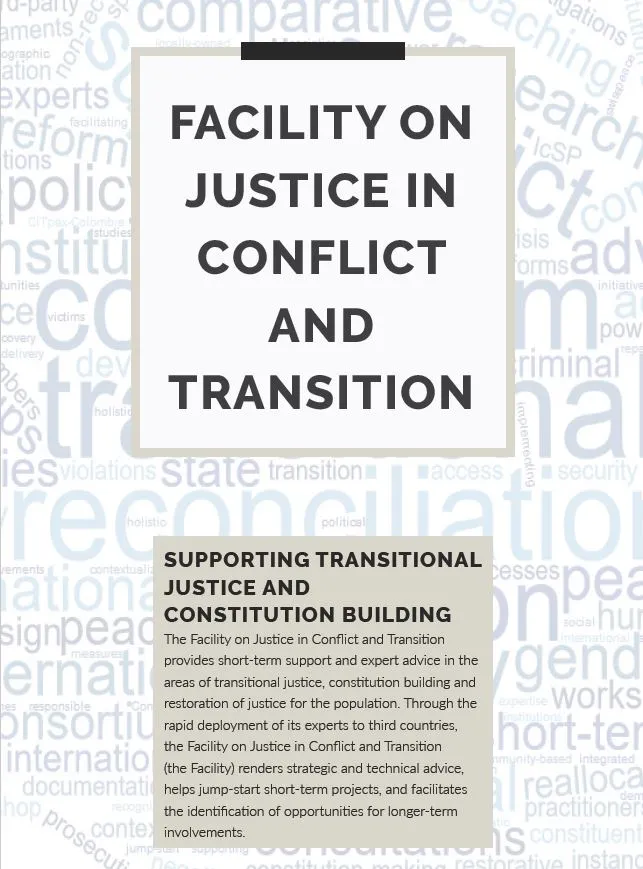Facility on Justice in Conflict and Transition

Supporting transitional justice and constitution-building
The Facility on Justice in Conflict and Transition provides short-term support and expert advice in the areas of transitional justice, constitution building and restoration of justice for the population. Through the rapid deployment of its experts to third countries, the Facility on Justice in Conflict and Transition (the Facility) renders strategic and technical advice, helps jump-start short-term projects, and facilitates the identification of opportunities for longer-term involvements.
Both the 2015 EU Policy Framework on Support to Transitional Justice and the 2018 EU Integrated Approach to External Conflicts and Crises underline the importance to embed the EU's support to transitional justice in the wider crisis response, conflict prevention, security and development efforts of the EU.
Background
The EU Policy Framework on Support to Transitional Justice provides a comprehensive basis for EU action on transitional justice. The policy framework identifies five key objectives: (1) ending impunity; (2) providing recognition and redress to victims; (3) fostering trust; (4) strengthening the rule of law; and (5) contributing to reconciliation. The EU policy puts a strong emphasis on the need for locally owned processes which are victim centred, inclusive and gender sensitive.
Transitional justice is defined as “the full range of processes and mechanisms associated with a society’s attempts to come to terms with a legacy of large-scale past abuses, in order to ensure accountability, serve justice and achieve reconciliation.” Such mechanisms may be judicial and non-judicial and include, inter alia, truth-telling processes; criminal justice initiatives in national, regional or international jurisdictions; reparation programmes; and measures to prevent recurrence including reform of abusive institutions.
Relatedly, constitution-building combines legal, political and social aspects of state transformation, often in contexts of post-conflict transition and democratic consolidation. Constitutions are increasingly tools for transitional justice and conflict management through, inter alia, reallocation of powers and (re)structuring the state, facilitating internal self-determination, recognizing identities, strengthening separation of powers and judicial independence, and protecting fundamental rights. In conflict-affected societies, parameters for constitutional reform and participation are often set during peace processes—though often with limited recognition that constitution making has begun.
Different transitional justice mechanisms are intrinsically related to each other, and constitution building is closely linked with transitional justice. In the holistic approach promoted by the EU, these processes are all embedded into wider crisis response, conflict prevention, post-conflict recovery, security, and development efforts.
Purpose
The purpose of the Facility on Justice in Conflict and Transition is to support transitional justice and constitution building processes in third countries affected by conflict or in transition through:
- provision of access to short term expertise, including the deployment of experts specialised in transitional justice and/or constitution-building covering a wide range of thematic and geographic areas.
- design and delivery of coaching, training, workshops and dialogues of varying duration to support country processes.
- research and development of knowledge products, contextual and comparative analyses, case studies, and guidance notes to support country processes.
ServicesConstitution-building assistance may include:
|
|
Assistance to transitional justice (TJ) may include:
|
Consortium
The consortium responsible for implementing the Facility on Justice in Conflict and Transition comprises the International Institute for Democracy and Electoral Assistance (International IDEA) as consortium leader, Conciliation Resources (CR), the International Center for Transitional Justice (ICTJ), the Toledo International Centre for Peace – Colombia (CITpax-Colombia), and the Swiss Peace Foundation (swisspeace).
The consortium members have been at the forefront of developing policy, providing technical support and managing projects worldwide in the areas of constitution-building and key legislation, restoration of justice for the population, and formal and community-based transitional justice processes.
The consortium members have direct and rapid access to highly skilled senior and junior experts, who have provided and continue to provide advice and assistance in virtually all contexts in which issues related to transitional justice and constitution building have arisen.
The facility is financed through the Instrument contributing to Stability and Peace (IcSP) of the European Commission’s Service for Foreign Policy Instruments.

Contacts
|
To request the support of the Facility on Justice in Conflict and Transition, please contact: Céline Aucouturier, European Commission, Foreign Policy Instruments Service, Programme Officer, at celine.aucouturier@ec.europa.eu.
|
For more information, contact
Elisabeth Baumgartner, Key Expert I of the Facility on Justice in Conflict and Transition, e.baumgartner@idea.int, or
Alexander Mayer-Rieckh, Key Expert II of the Facility on Justice in Conflict and Transition, a.mayer-rieckh@idea.int;
For more information on the Instrument contributing to Stability and Peace (IcSP), please consult the website of the Service for Foreign Policy Instruments.

